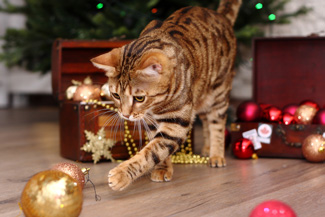Do cats understand physics ?
 In our newsletters, we sometimes report on dogs, crows, or even sea snails, but we rarely mention cats. Let’s rectify this oversight by looking at some Japanese research published in Animal Cognition, which highlights their ability to (humbly) understand some basic laws of physics, first documented by the likes of Newton and Einstein.
In our newsletters, we sometimes report on dogs, crows, or even sea snails, but we rarely mention cats. Let’s rectify this oversight by looking at some Japanese research published in Animal Cognition, which highlights their ability to (humbly) understand some basic laws of physics, first documented by the likes of Newton and Einstein. In their previous work, S. Takagi and her colleagues from the department of psychology at the University of Kyoto (Japan) showed that, using their hearing, cats could predict the presence of an invisible object. This ability to understand the principle of cause (sound) and effect (material presence) can be attributed to their sharp hearing. For the current study, the researchers wanted to also test felines' understanding of gravity.
They used a procedure known as "violation of expectations” to first observe whether the cat used the rule of causality to infer the presence of an invisible object by hearing a noise emitted inside an opaque box when shaken by an experimenter. Second, they wanted to see whether the animal was capable of predicting the appearance of the object when the box was turned over. In both (congruent) experimental conditions, the laws of physics were respected: if a sound was heard while the box was being shaken, an object would fall out of the box when it was turned over. If no sound came from the box, no object fell out. Of course, it’s the incongruous conditions (those that violate our expectations) that are the most interesting to study.
30 domesticated cats (average age = 2.9 years; 13 males, 17 females) participated in this experiment. The scientists were most interested to see how the animals behaved during the conditions that didn't adhere to the laws of physics. How did the cats react when they heard a sound in the box only to discover there was no object inside, or when they saw that there was an object inside but never heard a sound? The researchers put forth the hypothesis that in both incongruous experimental situations, the cats looked longer at the box when it was turned over, indicating their surprise and incomprehension.
Logically, the results indicate that the cats looked at the box longer when it was shaken by the experimenter and made a noise. This observation supports the idea that the cat uses a law of physics (causal logic) to deduce the presence (or absence) of an object. Similarly, in incongruous situations, the cats looked at the box longer, as if they were wondering why the object was or wasn't there. The researchers’ hypothesis thus appears to be confirmed, leading them to declare that “cats have a rudimentary understanding of gravity.”
According to the authors, the animals’ hunting instincts could explain this ability to infer the presence of an object from sound. Indeed, S. Takagi explains that “hunting cats often need to infer the location or the distance of their prey from sounds alone.”
Source: S. Takagi et al. “There’s no ball without noise: cat’s prediction of an object from noise”, in Animal Cognition, Sept. 2016 Futura Sciences: https://www.futura-sciences.com/sciences/actualites/science-decalee-science-decalee-chats-comprennent-lois-physiques-base-63306/







